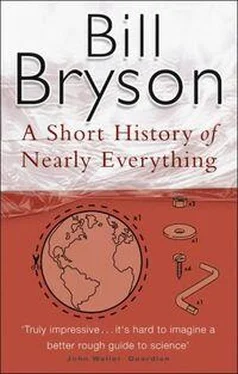“only shake my head in wonder . . .” Williams and Montaigne, p. 151.
“An airliner . . . reported being pelted with rocks.” Thompson, p. 123.
“Yet Yakima had no volcano emergency procedures.” Fisher et al., p. 16.
CHAPTER 15 DANGEROUS BEAUTY
“In 1943, at Parícutin in Mexico . . .” Smith, The Weather , p. 112.
“you wouldn’t be able to get within a thousand kilometers . . .” BBC Horizon documentary “Crater of Death,” first broadcast May 6, 2001.
“a bang that reverberated around the world . . .” Lewis, Rain of Iron and Ice , p. 152.
“The last supervolcano eruption on Earth . . .” McGuire, p. 104.
“for the next twenty thousand years . . .” McGuire, p. 107.
“you’re standing on the largest active volcano in the world . . .” Paul Doss, interview with author, Yellowstone National Park, Wyoming, June 16, 2001.
“devastatingly evident on the night of August 17, 1959 . . .” Smith and Siegel, pp. 5-6.
“as little as a single molecule . . .” Sykes, The Seven Daughters of Eve , p. 12.
“scientists were finding even hardier microbes . . .” Ashcroft, Life at the Extremes , p. 275.
“As NASA scientist Jay Bergstralh has put it . . .” PBS NewsHour transcript, August 20, 2002.
“99.5 percent of the world’s habitable space . . .” New York Times Book Review , “Where Leviathan Lives,” April 20, 1997, p. 9.
“water is about 1,300 times heavier than air . . .” Ashcroft, p. 51.
“your veins would collapse . . .” New Scientist , “Into the Abyss,” March 31, 2001.
“the pressure is equivalent to being squashed . . .” New Yorker , “The Pictures,” February 15, 2000, p. 47.
“Because we are made largely of water ourselves . . .” Ashcroft, p. 68.
“humans may be more like whales . . .” Ashcroft, p. 69.
“all that is left in the suit . . .” Haldane, What is Life? p. 188.
“the directors of a new tunnel under the Thames . . .” Ashcroft, p. 59.
“he had discovered himself disrobing . . .” Norton, Stars Beneath the Sea , p. 111.
“Haldane’s gift to diving . . .” Haldane, What Is Life? p. 202.
“his blood saturation level had reached 56 percent . . .” Norton, p. 105.
“But is it oxyhaemoglobin . . .” Quoted in Norton, p. 121.
“the cleverest man I ever knew.” Gould, The Lying Stones of Marrakech , p. 305.
“a very enjoyable experience . . .” Norton, p. 124.
“seizure, bleeding or vomiting.” Norton, p. 133.
“Perforated eardrums were quite common . . .” Haldane, What is Life? p. 192.
“left Haldane without feeling . . .” Haldane, What Is Life ? p. 202.
“It also produced wild mood swings.” Ashcroft, p. 78.
“the tester was usually as intoxicated . . .” Haldane, What Is Life ? p. 197.
“The cause of the inebriation . . .” Ashcroft, p. 79.
“half the calories you burn . . .” Attenborough, The Living Planet , p. 39.
“the portions of Earth . . .” Smith, p. 40.
“Had our sun been ten times as massive . . .” Ferris, The Whole Shebang , p. 81.
“The Sun’s warmth reaches it . . .” Grinspoon, p. 9.
“Venus was only slightly warmer than Earth . . .” National Geographic , “The Planets,” January 1985, p. 40.
“the atmospheric pressure at the surface . . .” McSween, Stardust to Planets , p. 200.
“The Moon is slipping from our grasp . . .” Ward and Browniee, Rare Earth , p. 33.
“The most elusive element of all . . .” Atkins, The Periodic Kingdom , p. 28.
“discarded the state silver dinner service . . .” Bodanis, The Secret House , p. 13.
“a very modest 0.048 percent . . .” Krebs, p. 148.
“If it wasn’t for carbon . . .” Davies, p. 126.
“Of every 200 atoms in your body . . .” Snyder, The Extraordinary Chemistry of Ordinary Things , p. 24.
“The degree to which organisms require . . .” Parker, Inscrutable Earth , p. 100.
“Drop a small lump of pure sodium . . .” Snyder, p. 42.
“The Romans also flavored their wine with lead . . .” Parker, p. 103.
“The physicist Richard Feynman . . .” Feynman, p. xix.
CHAPTER 17 INTO THE TROPOSPHERE
“Earth would be a lifeless ball of ice.” Stevens, p. 7.
“and was discovered in 1902 by a Frenchman in a balloon . . .” Stevens, p. 56; and Nature , “1902 and All That,” January 3, 2002, p. 15.
“from the same Greek root as menopause .” Smith, p. 52.
“severe cerebral and pulmonary edemas . . .” Ashcroft, p. 7.
“The temperature six miles up . . .” Smith, p. 25.
“about three-millionths of an inch . . .” Allen, Atmosphere , p. 58.
“it could well bounce back into space . . .” Allen, p. 57.
“Howard Somervell ‘found himself choking to death’ . . .” Dickinson, The Other Side of Everest , p. 86.
“The absolute limit of human tolerance . . .” Ashcroft, p. 8.
“even the most well-adapted women . . .” Attenborough, The Living Planet , p. 18.
“nearly half a ton has been quietly piled upon us . . .” Quoted by Hamilton-Paterson, p. 177.
“a typical weather front . . .” Smith, p. 50.
“equivalent to four days’ use of electricity . . .” Junger, The Perfect Storm , p. 128.
“At any one moment 1,800 thunderstorms . . .” Stevens, p. 55.
“Much of our knowledge . . .” Biddle, p. 161.
“a wind blowing at two hundred miles an hour . . .” Bodanis, E = mc 2 , p. 68.
“as much energy ‘as a medium-size nation.’ ” Ball, p. 51.
“The impulse of the atmosphere to seek equilibrium . . .” Science, “The Ascent of Atmospheric Sciences,” October 13, 2000, p. 300.
“Coriolis’s other distinction . . .” Trefil, The Unexpected Vista , p. 24.
“gives weather systems their curl . . .” Drury, p. 25.
“Celsius made boiling point zero . . .” Trefil, The Unexpected Vista , p. 107.
“Howard is chiefly remembered . . .” Dictionary of National Biography , vol. 10, pp. 51-52.
“Howard’s system has been much added to . . .” Trefil, Meditations at Sunset , p. 62.
“the source of the expression ‘to be on cloud nine.’ ” Hamblyn, p. 252.
“A fluffy summer cumulus . . .” Trefil, Meditations at Sunset , p. 66.
“Only about 0.035 percent of the Earth’s fresh water . . .” Ball, p. 57.
“the prognosis for a water molecule varies widely.” Dennis, p. 8.
“Even something as large as the Mediterranean . . .” Gribbin and Gribbin, Being Human , p. 123.
“Such an event occurred . . .” New Scientist , “Vanished,” August 7, 1999.
Читать дальше












